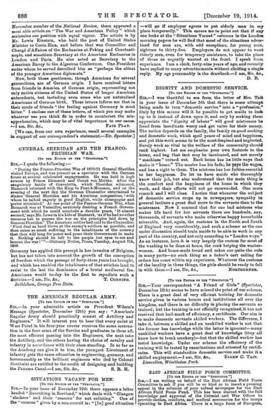DIGNITY AND DOMESTIC SERVICE.
[To THE EDITOR OP THE .8rzervron.") Sin,—I was thankful to see from the letter of Mrs. Tait in your issue of December 5th that there is some attempt being made to turn "domestic service" into a " profession." Only by this means will it be possible to get maids to look up to it instead of down upon it, and only by making them appreciate the "dignity of labour" will good mistresses be freed from inordinate worry and get value for their money. The nation depends on the family, the family on good cooking and domestic work, which spell peace of mind and happiness, and yet this work seems to be the most despised and neglected. Surely work so vital to the welfare of the community should rank highest. Let me emphasize your own footnote to the letter, and beg that tact may be inculcated, and not merely " machines " turned out. Each home has its little ways that make it "home." The master has his fade; he pays the wages, and has a right to them. The mistress has her foibles essential to her happiness. Do let us have maids who thoroughly know their job, but also understand that the main thing is the comfort and the happiness of the home in which they work, and their efforts will not go unrewarded. One more remark and I will close. I notice that whenever the subject of domestic service crops up in newspapers, sympathy in general inclines a great deal more to the servants than to the mistresses. Now I contend that for one bad mistress who makes life hard for her servants there are hundreds, nay, thousands, of servants who make otherwise happy households miserable. And, again, the customs in the North and South of England vary considerably, and such a scheme as the one under discussion should train maids to be able to work in any part of the country, and not only according to " London ways." As an instance, here it is very largely the custom for most of the washing to be done at home, the cook helping the washer- woman. And home-made bread and cakes are quite the rule in many parts—no such thing as a baker's cart calling for orders has come within my experience. Whatever the customs of the locality in these things, the girls should be ready to fall in with them.—I am, Sir, Ix., NORTHERNER,.






































 Previous page
Previous page